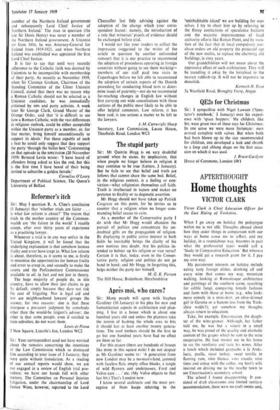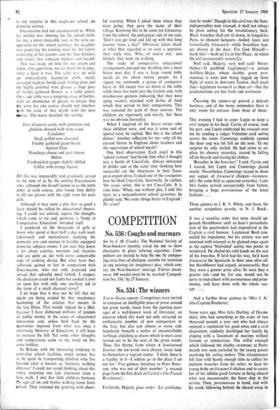Home thoughts
AFTERTHOUGHT VICTOR CLARK
Victor Clark is Chief Education Officer for the East Riding of Yorkshire.
When I go away on holiday the pedagogue within me is not idle. Thoughts abroad about how they order things in comparison with our ways at home cause me to reflect, and my holiday, in a roundabout way, becomes in part what the professorial types would call a 'Study in Comparative Education.' But whereas they would get a research grant for it, I pay my own way.
My paramount interests on holiday include eating tasty foreign dishes, drinking all and every wine that comes my way, mountain walking, looking at Romanesque architecture and paintings of the southern scene, searching for edible fungi, comparing female fashions and form with those at home (e.g., who looks more comely in a mini-skirt, an olive-skinned girl in Gerona or a buxom lass from the York- shire wolds?); yet somehow my thoughts always return to education.
Take, for example, Encarnacion, the daugh- ter of the wine-grower. Although, her father told me, he was but a viriero in a small way, he was proud of the quality and alcoholic content of the grapes which he sent to the wine cooperative. He had invited me to his home to see the vendimia and taste his wines. After a lunch which included gazpacho a la Anda- lucia, paella, roast turkey, sweet tortilla in flaming rum, vino blanco, vino rosado, vino tinto and coilac with the coffee, my host's wife insisted on driving me to the nearby town to see Encarnacion's secondary school.
The school I found disappointing. It con- sisted of drab classrooms and limited sanitary accommodation, there were no craft rooms and, to my surprise in this single-sex school, no domestic science.
Encarnacion had not accompanied us. While her mother was showing me the school (with, for me, a more enjoyable visit to the wine co- operative on the return journey), the daughter was preparing the evening meal for the family consisting of her parents and her four brothers and sisters, two vineyard workers and myself.
This was ready on time for our return and when, after,aperitivos, we sat down for la cena, what a feast it was. The table was set with an immaculately laundered cloth, neatly arranged napkins beside each shining plate and the highly polished wine glasses, a huge posy of freshly gathered flowers as a table centre. On a side table was a tempting array of bottles, with an abundance of glasses to ensure that the wine for one course should not interfere with the taste of that drunk with the next Ilourse. The menu matched the setting : Hors d'oeuvre varies, with pimentos and gherkins dressed with wine sauce Canalones Steak grilled over charcoal Freshly gathered green beans Apricot Flan Manchego cheese and goat cheese Melon Fresh-picked grapes slightly chilled Coffee with orange liqueur All this was impeccably and graciously served to the nine of us by the smiling Encarnacion who, although she herself joined us as the tenth diner at each course, also found time deftly to fill our glasses with the right wine for each dish.
Although it may seem a pity that so good a feast should be sullied by educational theoris- ing, I could not entirely repress the thoughts which came to me and, perforce. a 'Study in Comparative Education' intruded itself.
I pondered on the thousands of girls at home who spend at least half a day each week laboriously and meticulously studying the domestic arts and science in lavishly equipped domestic subjects rooms. I am sure they know a lot about calories, nutrients and vitamins and are quite au fait with every conceivable type of cooking device. But what have they achieved, gained or lost in comparison with Encarnacion, who not only prepared and served that splendid meal (which, I suspect, the dieticians could not fault) but cooked it over an open fire with only one ancillary aid in the form of a small charcoal stove?
I do hope that it may not be felt that my ideals are being eroded by that reactionary hardening of the arteries that occurs in the late fifties. That would, indeed, be a libel, bccause I have disbursed millions of pounds of public money in the cause of educational innovation and, unless held back by the economies imposed from what was once a reforming Ministry of Education, I still hope to increase the bill. Yet some other thoughts and comparisons came to my mind on this same holiday.
In Britain, with the increasing tendency to centralise school facilities, much money has to be spent in transporting children who live beyond what is known as 'statutory walking distance.' I could not avoid thinking about this when, returning one late afternoon from a long walk, I met five little children between lse ages of six and twelve walking home from school. They returned my greeting with cheer- ful courtesy. When I asked them where they were going, they gave the name of their village. Knowing this to be some ten kilometres from the school, the pedagogue side of me said, 'Don't you get tired and fed up with that long journey twice a day?' Obviously taken aback at what they regarded as so cissy a question, their reply was, 'Why, of course not,' and blithely they went on walking.
The study of comparative educational arrangements pursued me. Strolling into a local bistro next day, I saw a large round table neatly set for about twenty people. As I sipped my vermouth, a group of youngsters burst in. All except two sat down at the table while these two went into the kitchen and, with mischievous gestures indicating that they were aping waiters, returned with dishes of food which they served to their companions. This was repeated for each of three courses. The children ate vigorously and noisily, but there was no obvious horseplay.
When I inquired of the bistro owner who these children were, and was it some sort of special treat, he replied, 'But this is the school dinner.' Another reflection for me—why all the current furore in England about teachers and the supervision of school meals?
One final observation. Each pupil in this 'school canteen' had beside him what I thought was a bottle of Coca-Cola. Always interested in drinks and at the same time thinking how successful are the Americans in their Euro- pean export drive, I asked one of the youngsters how he liked Coca-Cola. Scornfully, he replied, 'De veras, seflor, this is not Coca-Cola. It is vino tinto.' When, not without glee, I told this story to a nonconformist school governor, he glumly said, 'We order things better in England.' De veras?



































 Previous page
Previous page